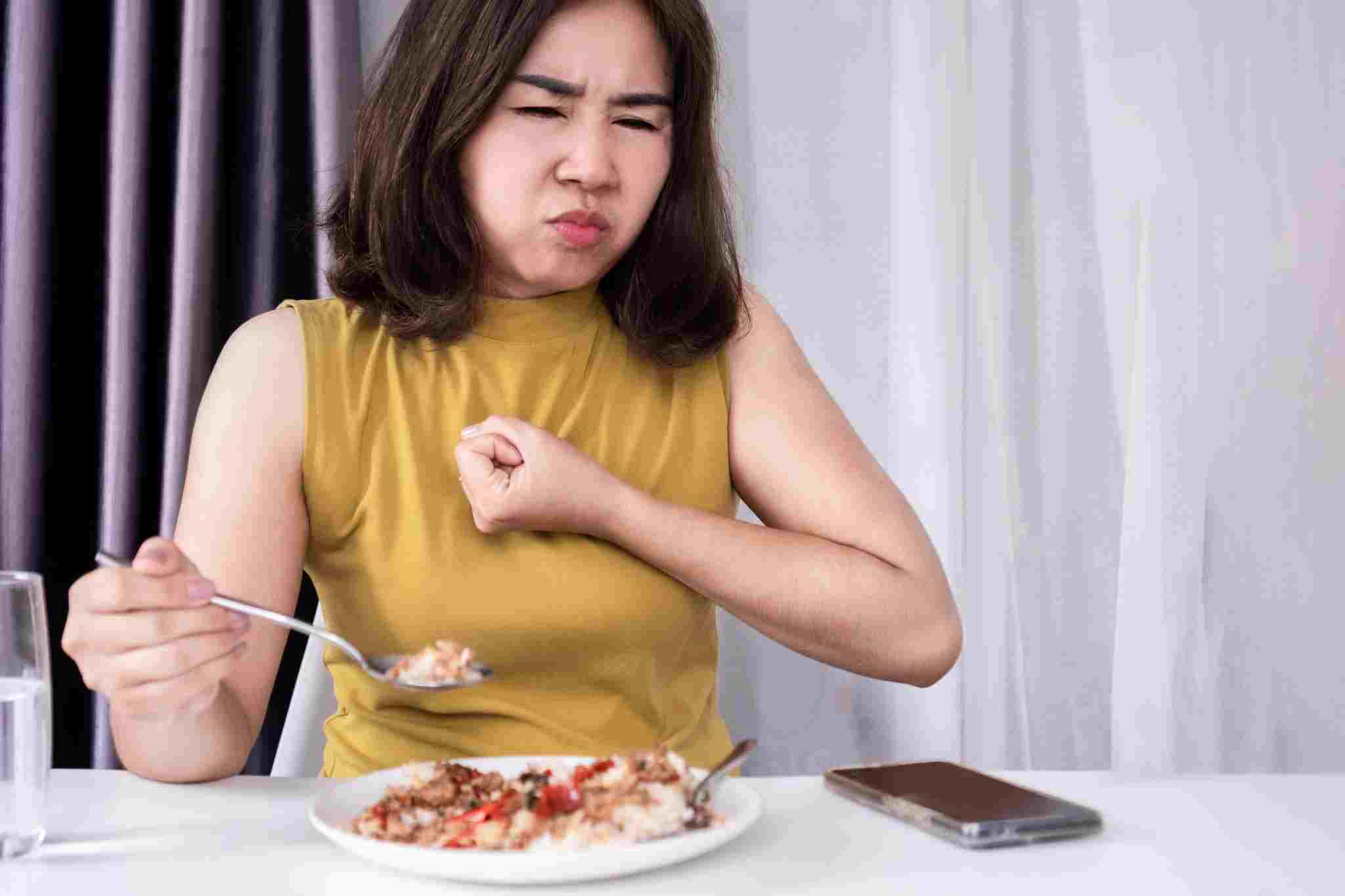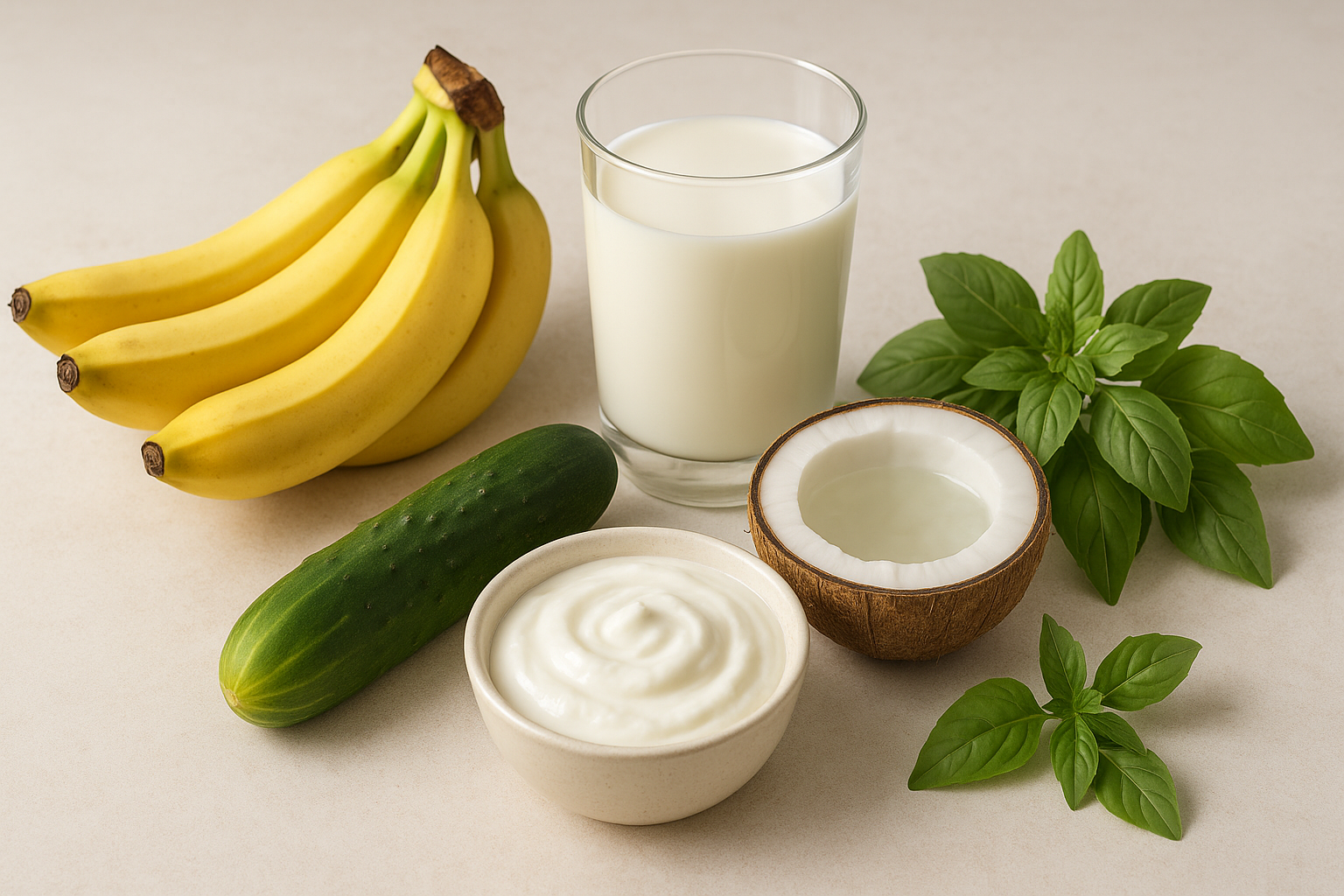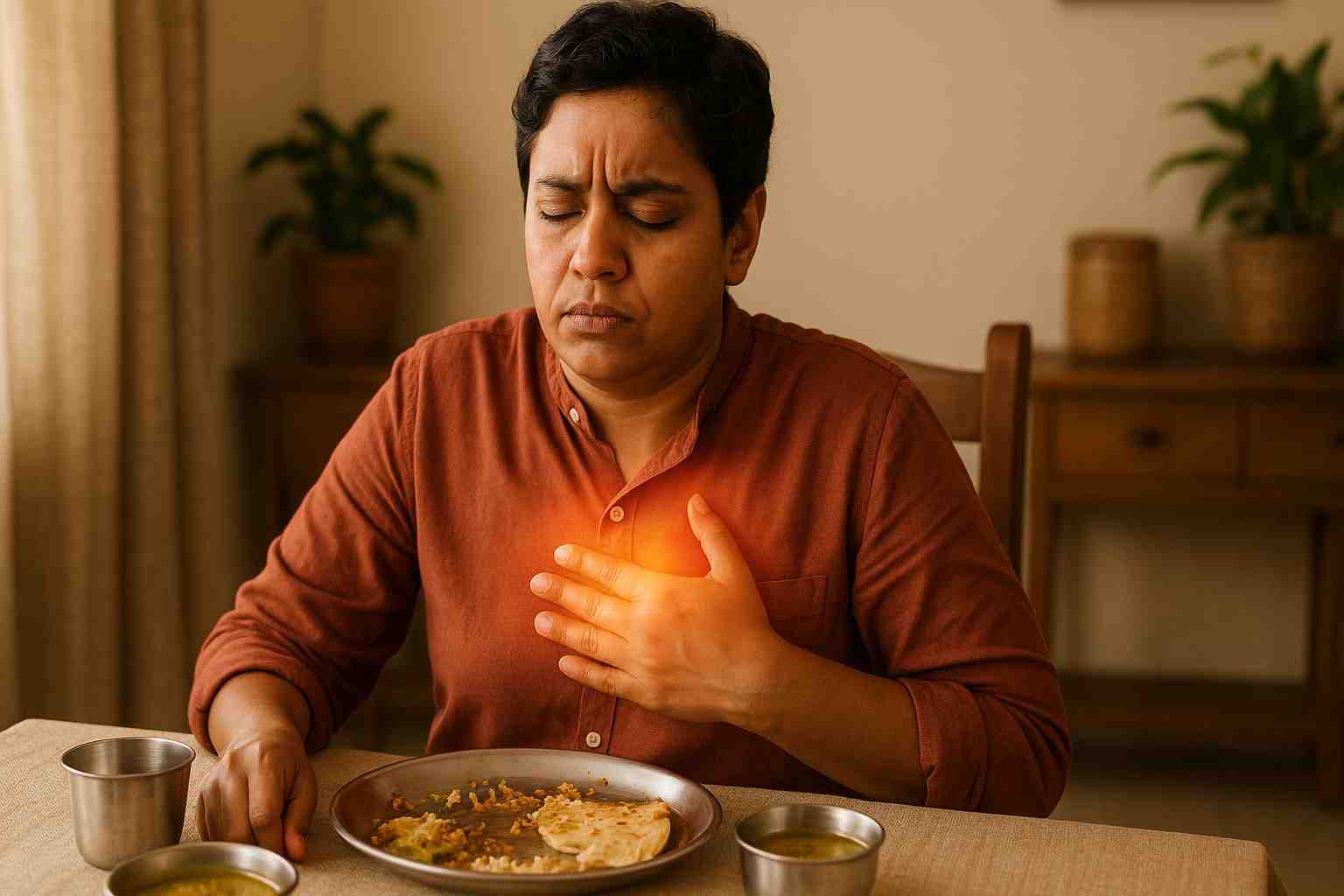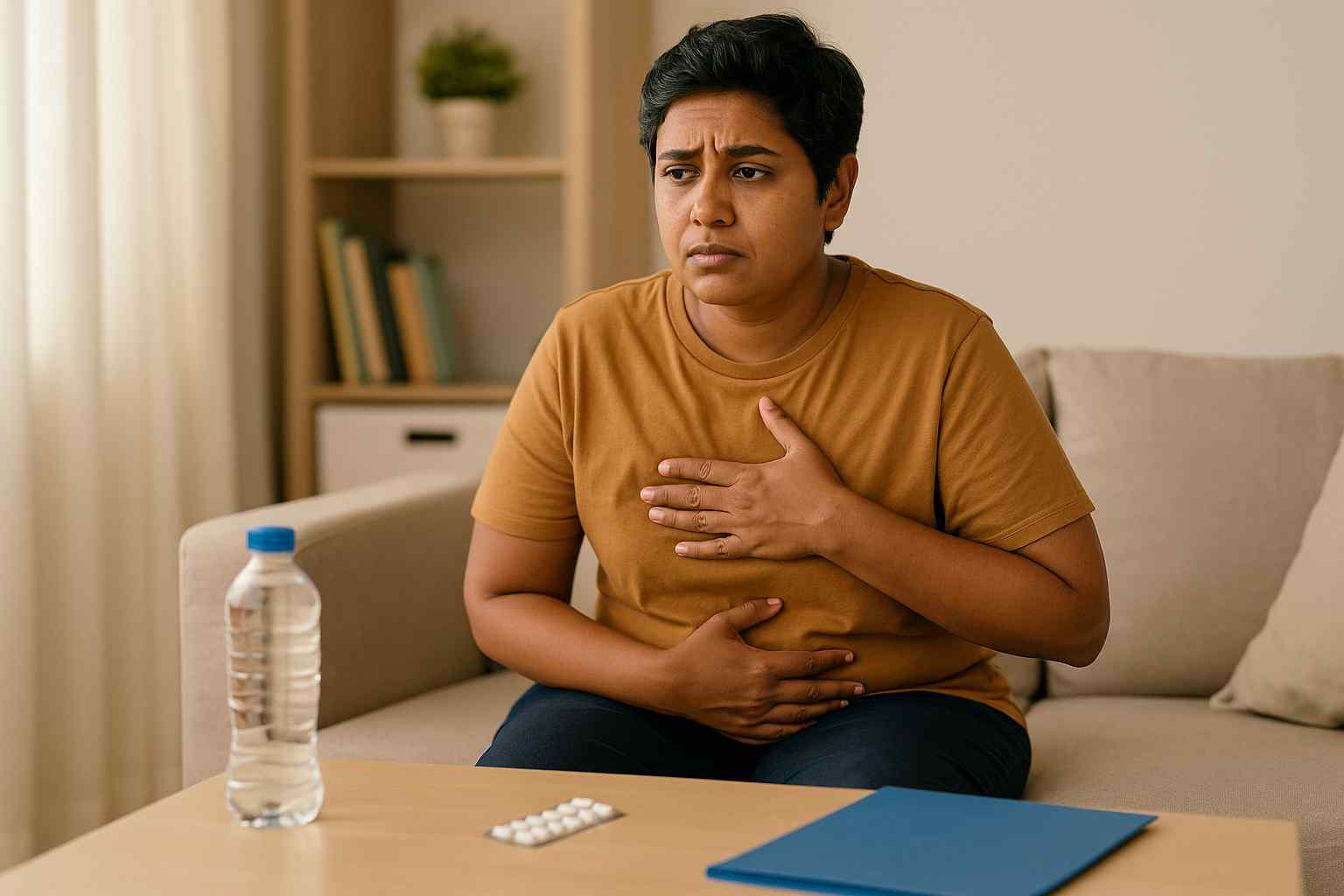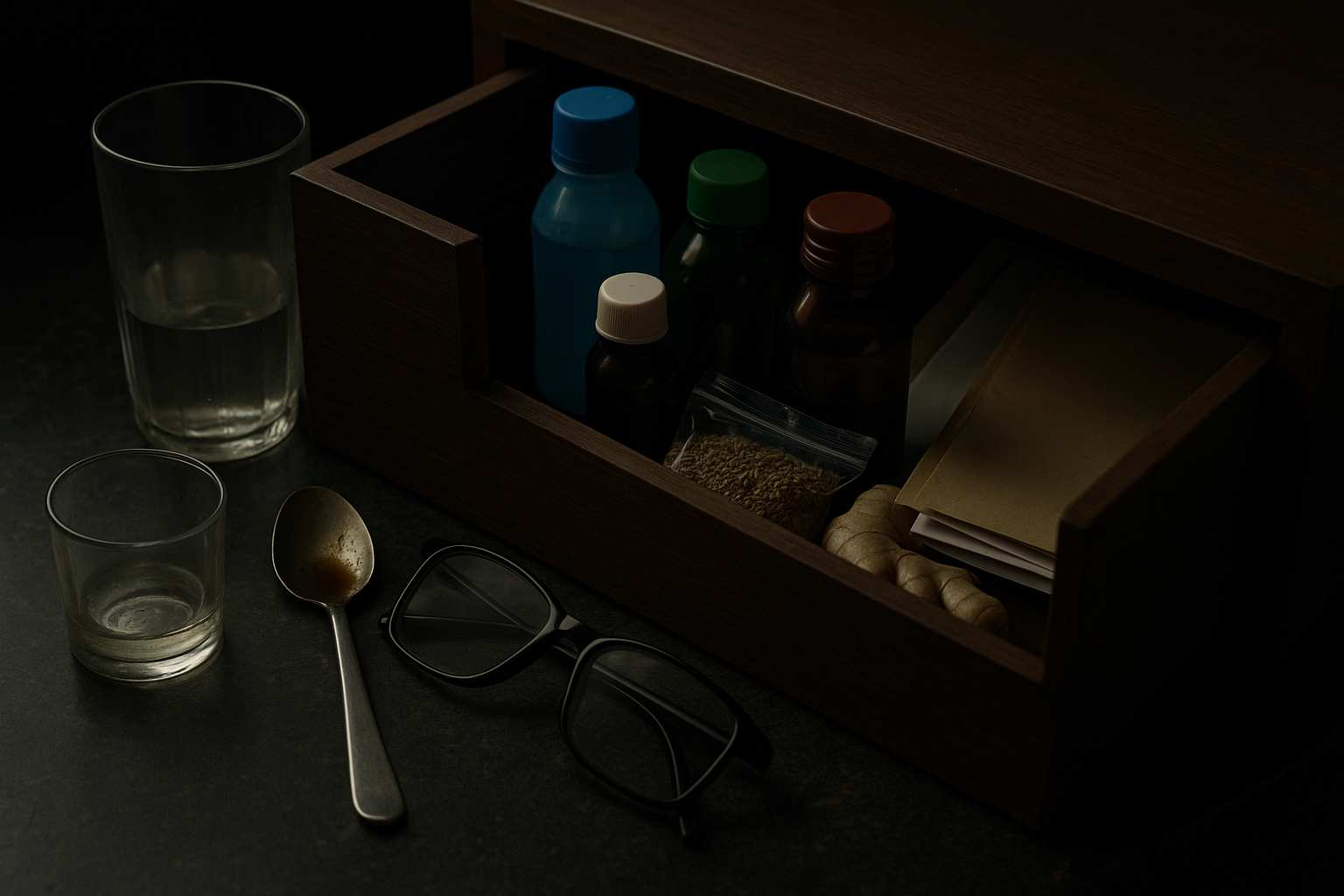Do you often feel an uncomfortable burning in your chest after meals? Where this used to be common in elders, now no one is unaffected. From children to elderly people, all experience this issue. However, very few are able to diagnose why it happens or how to fix it. So, this write-up is to guide you about the uncomfortable burning sensation in your chest after eating. Let’s explore the reasons behind that and what you can do to find relief.
What Exactly Is the Burning Sensation?
Is that burning in your chest normal? Well, no! It’s a digestive issue. Have you ever heard of the term Acidity? It’s that. The burning feeling in your chest is often a symptom of acid reflux or heartburn. What is Acid Reflux (GERD)? You may feel a burning sensation in your chest when acid from the stomach travels up into the food pipe. This is known as acid reflux or GERD.
The burning sensation often begins in the center of your chest and may rise toward your throat. But there could be other causes too, which you must know.
Common Causes of Burning Chest Pain After Eating
Several factors could trigger this discomfort. Here are some of the most common:
- Overeating: Eating too much stretches the stomach and weakens the lower esophageal sphincter.
- Fatty or Spicy Foods: These foods digest slowly and trigger excessive acid production in the stomach.
- Lying Down After Meals: Gravity helps keep acid in the stomach. Lying flat works against it.
- Carbonated Drinks: Gas buildup puts pressure on your digestive system.
- Smoking or Alcohol: Both can relax the valve between the stomach and esophagus.
- Tight Clothing: Pressure on the abdomen can push stomach acid upward.
These triggers can lead to that uncomfortable burning sensation in chest after eating that many of us dread.
Is It Just Heartburn, or Something More?
While heartburn is the most common reason, it’s important not to ignore frequent symptoms. Sometimes, it could signal a more serious issue, like Gastroesophageal Reflux Disease (GERD). Moreover, the symptoms could also indicate Hiatal Hernia, Esophagitis, or Gallbladder issues. If your symptoms occur more than twice a week or don’t improve, consult a doctor.
What Foods Make Acidity Worse?
Certain food items are more likely to trigger heartburn. Here’s a list that you should avoid eating to prevet acidity:
| Food Category | Examples | Effects |
| Acidic | Citrus fruits, tomatoes | Irritate the esophagus lining |
| Fatty & Oily | Fried food, cheese, red meat | Slow digestion |
| Spicy | Hot peppers, curries | Increase acid production |
| Caffeinated Items | Coffee, chocolate | Loosen the LES |
| Carbonated Drinks | Soda, sparkling water | Add gas pressure |
| Smoking & Alcohol | Wine, beer, cocktails | Relaxes the esophageal valve |
A bad diet can disturb your entire digestion. So, it is highly recommended to skip or limit the intake of these food items. This can help reduce the burning sensation in chest after eating.
How to Prevent a Burning Sensation in the Chest?
You can prevent frequent acidity with a little change to your lifestyle. Follow the given lifestyle tips and get rid of the uncomfortable acidity issue:
- Eat smaller meals throughout the day, because large meals increase stomach pressure and acid production.
- Avoid eating 2-3 hours before bed and stay upright after eating. Gravity keeps acid down.
- Don’t rush while eating food. It’s always suggested to chew slowly and take your time. This helps improve digestion.
- You should try to keep your head and upper body elevated while sleeping. Using a wedge pillow can help.
- Maintain a healthy diet and avoid high-acid foods. Try to include more fiber to improve digestion.
- Do you know Body Weight Impacts Acid Reflux? Yes, it plays a huge role. Excess fat around the abdomen adds pressure on your stomach, causing acidity.
- Also, prefer to wear loose-fitting clothes, as tightly fitted clothes put pressure on your stomach.
These small changes can make a big difference in how you feel after eating.
Try Quick Home Remedies!
Here are a few easy remedies that might bring fast relief:
- Chew sugar-free gum to increase saliva and wash away acid.
- Eat low-acid foods like a banana or oatmeal, soothing and good for digestion.
- Sip cold water frequently to cool the burning and flush acid down.
- Drink aloe vera juice or herbal teas in small amounts to reduce inflammation.
- Skip late-night snacks and go for a short walk after meals to help digestion.
- Try a wedge pillow to elevate your head if symptoms occur at night.
Still dealing with that burning sensation in chest after eating? If none of the home remedies worked, it might be time to consider medication.
Use Antacid
Sometimes, lifestyle changes take time to show results. Well, then, users are confused about which to choose: Home Remedies vs Medicinal Treatments. However, if symptoms are mild and infrequent, antacids can help. An effective antacid will neutralize stomach acid and work quickly on digestion issues. But it’s very important to know the details about it.
You can take an antacid about 30 minutes after eating or when the discomfort starts. Make sure to follow dosage instructions on the label. So, how do you figure out which antacid works best for you? We are here to help!
Go for Gaviscon Antacid- Why?
For quick relief from a burning sensation in chest after eating, use Gaviscon Oral Suspension. It offers an effective solution for acidity, indigestion, and heartburn. Wondering why Gaviscon?
- It quickly creates a barrier to stop acid from moving upward.
- Starts working within minutes to ease discomfort.
- To taste better and cooler, it is available in peppermint flavor.
- It is also safe for pregnant and breastfeeding women with a doctor’s consent.
- Long-lasting medication for antacids, as compared to many standard ones.
Whether you had a spicy meal or just feel the burn coming on, Gaviscon is a reliable, over-the-counter option to calm things down. Still, if the symptoms continue, it’s important to consult a doctor rather than relying on self-treatment. For frequent issues, talk to a healthcare provider about long-term solutions.
When to See a Doctor?
Does that burning sensation in chest after eating still linger, even after trying every remedy? Don’t ignore your symptoms if they include:
- Pain radiating to the arms or neck
- Trouble swallowing
- Nausea or vomiting
- Weight loss
- Frequent nighttime symptoms
Such symptoms might point to a condition more serious than just heartburn. Consult a doctor!
Final Thoughts
A burning sensation in chest after eating may feel alarming, but in most cases, it’s manageable. With better food habits, awareness of your triggers, and the right remedies, both natural and medicinal. Hence, with Gavicson Antacid, you can enjoy your meals without discomfort. Start by making small changes. Be consistent. And if you ever feel unsure, don’t hesitate to speak with a doctor.
Disclaimer: This content is just for general information and advice. It’s not meant to replace a doctor’s opinion. Always talk to a medical expert or your own doctor for proper guidance. AcidRefluxindia is not responsible for how you use this information.



